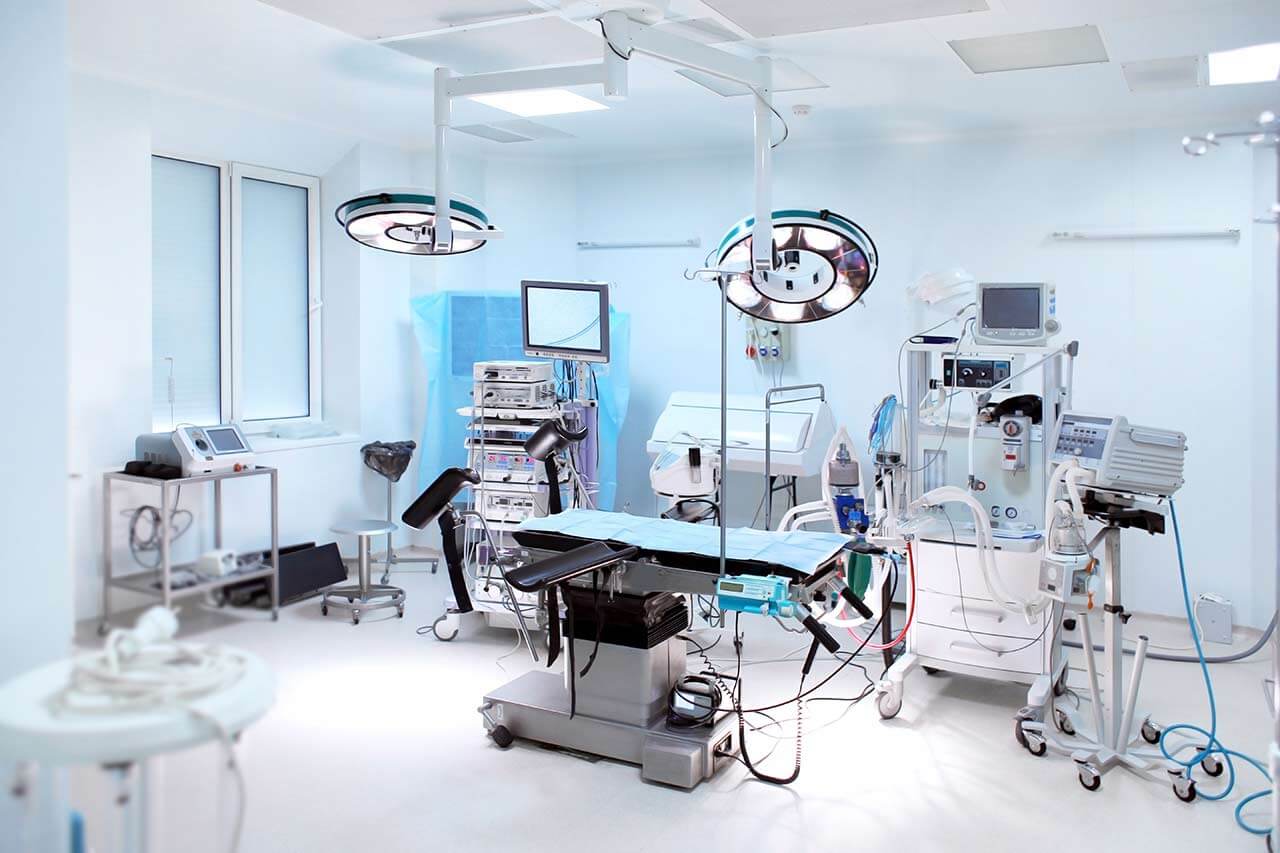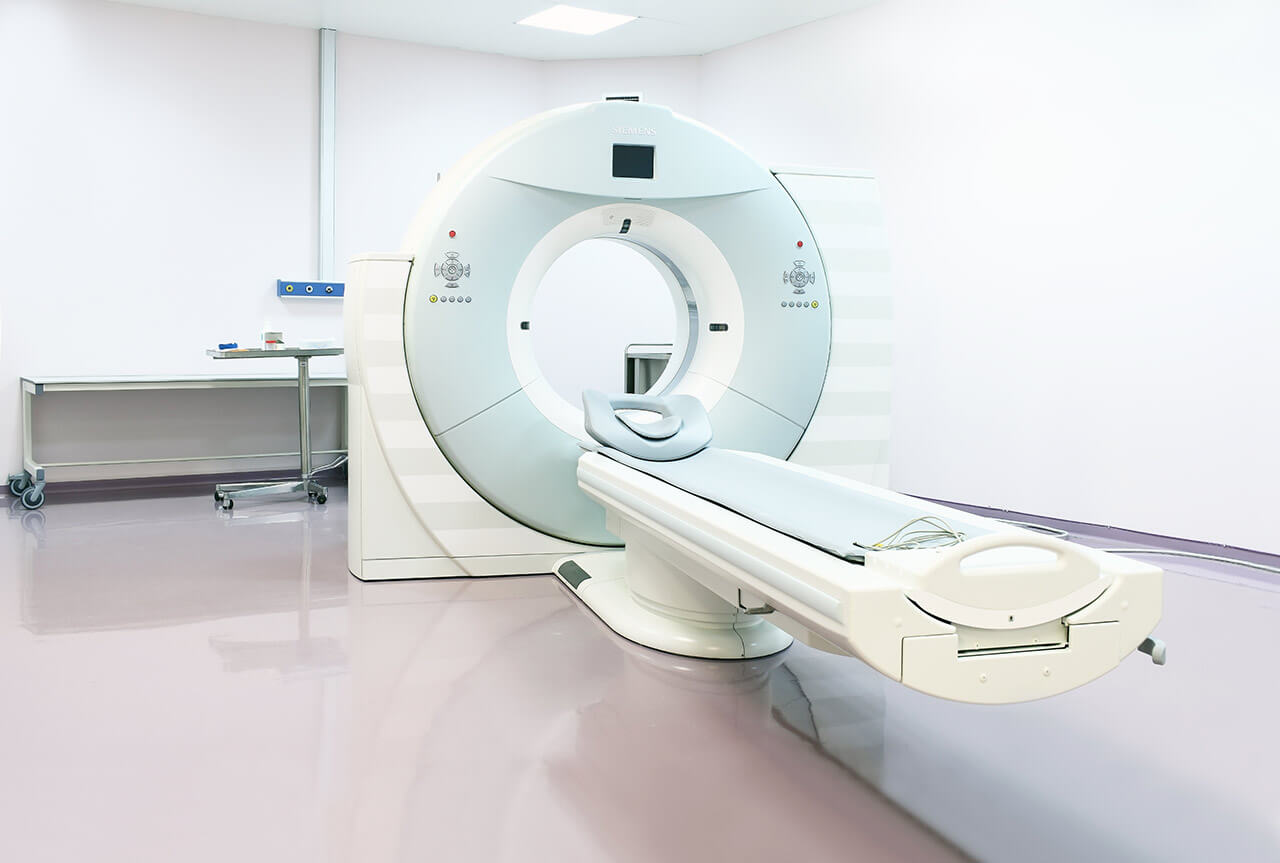
About the Department of Gynecology at Asklepios Hospital Barmbek Hamburg
The Department of Gynecology at the Asklepios Hospital Barmbek Hamburg offers the full range of medical services for women with benign and malignant diseases of the reproductive system. The primary focus of the department's specialization is the treatment of female reproductive cancers, such as uterine cancer, cervical cancer, ovarian cancer, vaginal cancer, and vulvar cancer. Patients with benign gynecologic diseases such as endometriosis, uterine myomas, cervical dysplasia, polycystic ovaries, pelvic prolapse, and urinary incontinence are also treated here. The department is proud of its advanced operating rooms, adapted to perform sparing minimally invasive interventions. The department's gynecologists also have a perfect command of the da Vinci robot-assisted surgical techniques. Such operations are characterized by high precision and a low trauma rate, while their efficiency is not inferior to open surgery. The da Vinci surgical system is successfully used in the department for the removal of uterine and cervical malignancies, the removal of myomas, the treatment of endometriosis, and the repair of pelvic organ prolapse. Operations using the da Vinci surgical system are performed by specially trained surgeons with experience in performing interventions of this kind. The department's team of gynecologists works hand in hand with breast specialists, obstetricians, urologists, radiologists, oncologists, and other experts to provide each patient with comprehensive medical care. The department is headed by Prof. Dr. med. Gerhard Gebauer.
The department is part of the Cancer Center, certified by the German Cancer Society (DKG). Therefore, the medical facility has advanced knowledge and long experience in the diagnostics and treatment of cancer of the female reproductive system. The most common cancers in the department's clinical practice are uterine, cervical, and ovarian cancers. Should cancer be suspected, the first step is comprehensive diagnostics. If cervical cancer is suspected, a Pap test and colposcopy are performed. If the results of these examinations are unsatisfactory, a biopsy will be prescribed. If the cervical tumor has spread outside the organ, additional imaging (ultrasound, X-ray, CT, or MRI scans) is performed to detect the affected lymph nodes and metastases. If, based on the diagnostic results, a gynecologist confirms the diagnosis of cervical cancer, an interdisciplinary tumor board elaborates a treatment regimen. An important factor in the planning of treatment tactics is the stage of cancer, the age of the woman, and her general health condition. In the early stages of cancer, the department's gynecologists give preference to minimally invasive organ preservation tumor resection. A trachelectomy, the surgical removal of the cervix and adjacent tissues, is usually performed for young women. This treatment option allows doctors to achieve good therapeutic results and preserve fertility. Patients with advanced stages of cervical cancer undergo a hysterectomy, a surgical procedure to completely remove the uterus, after which a woman has no chance to become pregnant and give birth to a child. Hysterectomy is a last-line surgical treatment and may only be prescribed when doctors consider other types of surgical procedures ineffective. Hysterectomy is performed in the department either through a transabdominal approach or a minimally invasive approach. Hysterectomy using the da Vinci surgical system is also practiced here. In advanced stages of cervical cancer, the operation is supplemented with chemotherapy and/or radiation therapy.
Women with ovarian cancer often seek medical help from the health facility. The diagnostic protocol for suspected ovarian cancer includes the study of the patient's medical history, ultrasound scans, computed tomography, magnetic resonance imaging, and biopsy. The first-line treatment for ovarian cancer is a surgical intervention, the extent of which depends on the stage of the oncological process. If the tumor is localized and does not spread beyond the organ, surgeons remove the ovaries and the uterus during the procedure. When ovarian cancer is diagnosed in young women who have plans to conceive a child in the future, gynecologists strive to perform a more sparing surgical treatment during which only one ovary is removed while preserving the second one and the uterus. Following surgery, chemotherapy is almost always required. In cases of advanced ovarian cancer, the most effective treatment is cytoreductive surgery, during which the specialists remove all visible cancer foci in the abdomen and pelvic cavity. The resection may be extensive, involving the removal of not only the ovaries, uterus, fallopian tubes, and lymph nodes but also parts of the colon, greater omentum, a portion of the bladder, or even the intestines. The decision on the optimal type of surgery and additional conservative treatment methods is made during an interdisciplinary tumor board.
The department's team of doctors also specializes in the treatment of benign gynecologic diseases. Of particular interest in this area is the treatment of endometriosis. In this condition, cells similar to the inner layer of the uterus (endometrium) grow outside the uterus, for example, on the peritoneum, ovaries, or fallopian tubes. Despite its benign nature, endometriosis causes serious discomfort and health problems, and can potentially lead to infertility. Diagnosis requires a number of tests, including gynecologic examination, ultrasound scanning, and laparoscopy. As for the treatment, it can be both conservative and surgical. If small foci of endometriosis are detected, the department's gynecologists prescribe a course of drug therapy, which is based on the intake of hormones. Severe forms of the pathology with the formation of large foci of endometriosis are most often treated with surgery. The department's specialists perform surgery using minimally invasive techniques, so patients recover very quickly and there is no need for a long hospital stay. In some clinical cases, the department's gynecologists combine surgery with hormone therapy.
The department specializes in the diagnostics and treatment of the following gynecologic diseases:
- Malignant gynecologic diseases
- Uterine cancer
- Cervical cancer
- Ovarian cancer
- Vaginal cancer
- Vulvar cancer
- Benign gynecologic diseases
- Endometriosis
- Uterine fibroids
- Cervical dysplasia
- Polycystic ovary syndrome
- Pelvic organ prolapse
- Urinary incontinence
- Other pathologies
The department's range of diagnostic and therapeutic options includes:
- Diagnostics
- General gynecologic examination
- Colposcopy
- Hysteroscopy
- Laparoscopy
- Ultrasound scans
- Computed tomography
- Magnetic resonance imaging
- Laboratory tests
- Biopsy followed by a histological examination
- Treatment
- Conservative treatment
- Drug therapy, including hormone therapy and chemotherapy
- Botulinum toxin injections for urinary incontinence
- Surgical treatment
- Minimally invasive surgery
- Uterine fibroid removal
- Hysterectomy (removal of the uterus)
- Endometriosis surgery
- Surgery for uterine, ovarian, vaginal, and vulvar malignancies
- Robot-assisted interventions using the da Vinci surgical system
- Surgery for uterine, ovarian, vaginal, and vulvar malignancies, including lymph node removal
- Targeted removal of pelvic sentinel lymph nodes in cases of malignant diseases
- Hysterectomy
- Uterine fibroid removal
- Endometriosis surgery
- Reconstructive plastic surgery for pelvic organ prolapse
- Open surgery (performed extremely rarely)
- Minimally invasive surgery
- Conservative treatment
- Other medical services
Curriculum vitae
Higher Education
- 1988 - 1995 Medical studies, Christian Albrecht University of Kiel.
- 1996 Thesis defense and doctorate, Institute of Immunology, Christian Albrecht University of Kiel.
- 2003 - 2006 Management studies, Master of Business Administration, Neu-Ulm University of Applied Sciences and Hannover University of Applied Sciences and Arts.
Professional Career
- 1995 - 2000 Preparation for board certification, Research Fellow, Department of Gynecology, University Hospital Erlangen-Nuremberg.
- 2000 - 2002 Research Fellow, Sidney Kimmel Comprehensive Cancer Center, San Diego, California, USA.
- 2000 Board certification in Gynecology and Obstetrics, Bavarian Medical Association.
- 2003 - 2004 Senior Physician and Surgeon, Department of Gynecology, Hannover Medical School.
- 2003 - 2004 Project management for the construction, equipment, and commissioning of the Gynecology Center at the Hannover Medical School.
- 2003 Habilitation and the title of PD, Hannover Medical School.
- 2003 Fellowship, Sidney Kimmel Comprehensive Cancer Center, San Diego, California, USA.
- 2004 - 2008 Managing Senior Physician, Department of Gynecology, University Hospital Heidelberg.
- 2005 Professorship, Ruprecht Karl University of Heidelberg.
- 2005 Fellowship, St. Vincent Hospital Cancer Center, New York, USA.
- 2005 Fellowship, Department of Oncology, Institut Jules Bordet, Belgium.
- 2006 - 2008 Advisory Board Member of the Tumor Bank, National Center for Tumor Diseases, University Hospital Heidelberg.
- 2006 Extraordinary Professorship, Ruprecht Karl University of Heidelberg.
- 2007 - 2008 Ethics Committee Member, Ruprecht Karl University of Heidelberg.
- 2007 - 2008 Advisory Board Member, Clinical Research Coordinating Center, Ruprecht Karl University of Heidelberg.
- 2008 Additional qualification in Specialized Gynecologic Surgery with a focus on Gynecologic Oncology.
- 2009 - 2017 Head Physician, Department of Gynecology, St. Mary's Hospital Hamburg.
- Since 2017 Head Physician, Department of Gynecology, Asklepios Hospital Barmbek Hamburg.
Research Interests
- Study of gene expression in cancer.
- Clinical research in the field of gynecologic oncology and mammology.
- Drug therapy of female reproductive cancers and breast cancer.
- Treatment of micrometastases in breast and ovarian cancer.
- Study of molecular markers of cervical cancer.
- Study of molecular changes in breast and ovarian cancer.
Prizes, Awards and Honors
- 1999 Poster Award, Hamburg Symposium on Tumor Markers.
- 2002 ASCO Merit Award, 38th Annual Meeting of the American Society of Clinical Oncology (ASCO), USA.
- 2003 Presentation Award, Working Group on Gynecologic Oncology (AGO).
- 2004 ASCO Merit Award, 40th Annual Meeting of the American Society of Clinical Oncology (ASCO), USA.
- 2004 Best Research Award, North Eastern German Society of Gynecological Oncology (NOGGO).
- 2005 Presentation Award, joint meeting of the German Society for Senology (DGS), the Austrian Society for Senology (ÖGS) and the Swiss Society for Senology (SGS).
Memberships in Professional Societies
- American Society of Clinical Oncology (ASCO).
- Working Group on Gynecologic Endoscopy (AGE).
- Working Group on Gynecologic Oncology (AGO).
- Professional Association of Gynecologists (BVF).
- Gynecology and Obstetrics Federation of Germany (BLFG), Chairman of the Hamburg Association of Gynecologists.
- German Society for Gynaecology and Obstetrics (DGGG).
- German Society for Senology (DGS).
- German Society of Ultrasound in Medicine (DEGUM), Division of Breast Ultrasound.
- German Cancer Society (DKG).
- European Society of Gynaecological Oncology (ESGO).
- Hamburg Obstetrics Society.
- North German Society of Gynecology and Obstetrics (NGGG).
- North Eastern German Society of Gynecological Oncology (NOGGO).
- Germany Society of Managing Physicians (VLK).
Photo of the doctor: (c) Asklepios Klinik Barmbek





